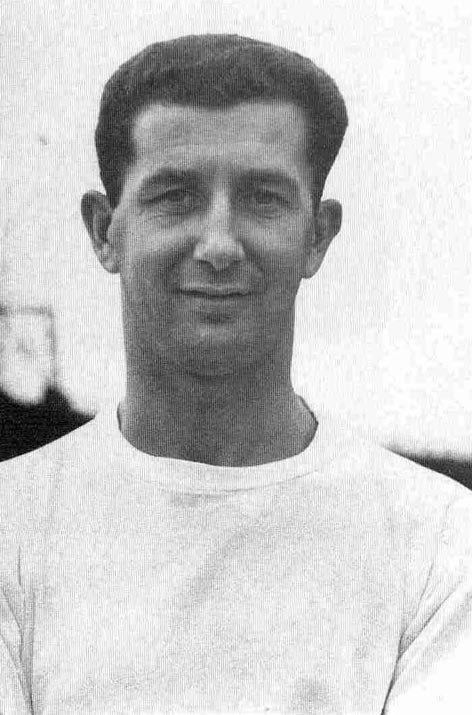

Goodwin: Frederick (Freddie)
1960-1964
(Player Details)
Centre Half
Born: Heywood, Lancashire 28-06-1933
Debut v Manchester City (h): 19-03-1960
6’11/2” 13st 4lb (1960)
Goodwin turned professional with Manchester United in October 1953, after shining at
Chorlton County Secondary School. He was a “Busby Babe”. He made his senior debut for the
club on 20th November 1954 against Arsenal in a 2-1 home win, but had only played thirteen
times in over three years prior to the Munich air disaster in February 1958, which gave
him his chance to establish himself in the aftermath and he played in the side which lost
2-0 in that year’s F.A. Cup Final to Bolton Wanderers. His first goal did not arrive until
25th October 1958 in a 1-2 defeat by West Bromwich Albion at Old Trafford. In his United
career, he scored seven goals in ninety-five League appearances, made three appearances in
the European Cup and one in the Charity Shield and added a further goal in eight F.A. Cup
games. That goal in the F.A. Cup was in his final game for United and came in a 4-2 away
win in the Third Round at Derby County on 9th January 1960. So in total he scored eight
goals in one hundred and seven games while at Old Trafford. He joined Leeds in March 1960
for £10,000 and partnered Jack Charlton in defence, often from the right half position,
although he became better known as a centre half. He also Captained Leeds until the arrival
of Bobby Collins. His career with Leeds came to an end when he suffered a triple fracture
of a leg on 4th January 1964 at Cardiff City in a tackle by John Charles. It was the worst
of a succession of injuries that the popular defender was plagued with and eventually
resulting in his retirement from playing on 1st December 1964. He became Scunthorpe
United’s Player-Manager in November 1964 and played five times and once as a substitute and
scored one goal. He joined the club at a time of disquiet, but despite the many problems he
soothed the situation with a firm and quiet, but positive, approach to matters. His
reassuring manner quickly won supporters over, as the team gradually improved. Freddie
Goodwin was a towering figure at over six foot, and stockily built. He soon brought a
number of his own players into the first team to good effect, including Ray Clemence, who
was nursed through the junior ranks into the first eleven prominence. He was also
responsible for other signings such as Geoff Sidebottom, Keith Burkinshaw, Frank Burrows,
Brian Bedford and Bobby Smith. When the old hands failed he was not frightened to blood
youngsters. On one infamous occasion, Goodwin put too many inexperienced men in the side
and Grimsby Town overwhelmed them, but Freddie was humble enough to make a public apology.
Under Goodwin's control Scunthorpe enjoyed a fourth spot in the 1965-66 season, and gained
a record 8-1 home triumph over Luton Town. He left Scunthorpe United on 1st June 1966. In
November 1966 he joined the New York Generals as Manager, returning to England in October
1968 to manage Brighton and Hove Albion. In May 1970 he went to Birmingham City and steered
them back into the First Division in 1972. It was at Birmingham where he introduced the
young Trevor Francis into league football. He was also known for introducing yoga,
psychological testing and other new training techniques. He stayed at St Andrews until
September 1975 and returned to the USA the following year as Manager-Coach of Minnesota
Kicks. During the 1980s he recruited players for the American Indoor League. He was also a
noted cricketer, playing eleven times for Lancashire and taking twenty-seven wickets and
scoring forty-seven runs.